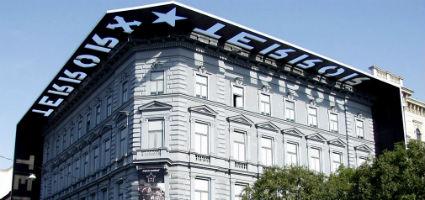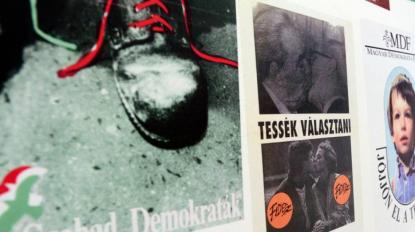2024. May 3. Friday
House of Terror Museum - Budapest
 |
Address: 1062, Budapest Andrássy út 60.
Phone number: (1) 374-2600
E-mail: muzeum@terrorhaza.hu
Opening hours: Tue-Sun 10.00-18.00
|
The exhibition has closed for visitors.
2015.06.15. - 2015.10.31.
Museum tickets, service costs:
|
Ticket
(valid for the temporary exhibitions, the permanent exhibition is not included )
|
1000 HUF
|
/ capita
|
|
Ticket for adults
|
2000 HUF
|
|
|
Group ticket for adults
(from over 20 people)
|
1500 HUF
|
/ capita
|
|
Ticket for students
(EU citizens from the age of 2 to 26 or with ISIC Card )
|
1000 HUF
|
|
|
Group ticket for students
(from over 20 people)
|
800 HUF
|
/ capita
|
|
Ticket for pensioners
(EU citizens from the age of 62 to 70)
|
1000 HUF
|
|
|
Group ticket for pensioners
(from over 20 people)
|
800 HUF
|
/ capita
|
|
Supplementary fee
(valid for the temporary exhibitions, extra ticket for the permanent exhibition )
|
500 HUF
|
/ capita
|
|
Group guide
(max. 30 people)
|
6000 HUF
|
|
|
Group guide
(2 groups, max. 60 people)
|
8000 HUF
|
|
|
Group guide
(max. 30 people)
|
8000 HUF
|
|
|
Group guide
(2 groups, max. 60 people)
|
15000 HUF
|
|
|
Audio guide
(in English, German)
|
1500 HUF
|
„In 1989–90 Hungarians and people of the region took control of their destiny, they were not willing to continue to tolerate foreign domination, and the communist dictatorship imposed on them. This is called a revolution ... The winner of the revolutionary wave swept from our region the rule of Soviet communism that is barely visible trace left. In an instant we took possession of our countries, our lives again.”Mária Schmidt

The first free elections in 1990 were a milestone in the process of changing the system. With the two-round vote that took place on 25 March and April 8th, the political and legal transition process was completed; a new era began in the history of Hungary.
The disintegration of the communist regime, which sped up after restructuring of the international balance of power economic failure, and mass movements and protests in the 1980 and became irreversible after the free elections in 1990. The stepped through dictatorship to democracy, from one-party system to a multi-party system. Instead of foreign occupation, national independence took over. This peaceful process took place without bloodshed revolutionary and meant change in the life of the country.
The atmosphere was characterized by expectation, hope and euphoria as the first multi-party democratic elections were held in Hungary after more than forty years. During the campaign, consciously developed, mediated messages, electoral slogans played the same role as the somewhat clumsy, amateurish, improvised and innovative solutions.
The temporary exhibition deals with this colourful world by showing posters, leaflets, banners, campaign supplies presents. We selected from the most important political actors' quotations, and also recall the most typical campaign videos and news reels.
On period contemporary TV sets screen interview excepts detail: witnesses recall the events of significant changes to the system, telling their story of election-related memories. We will also have Jukeboxes with about one hundred hits to play. On touch screen we introduce six MPs representing their party and also how elections took place in other countries in the region. We put special emphasis on József Antall, the first democratically elected Prime Minister after the political changes.
The elections of 1990 had historical significance in the process of political changes. With the end of an era, a new beginning came: the beginning of an independent and democratic Hungary.

The first free elections in 1990 were a milestone in the process of changing the system. With the two-round vote that took place on 25 March and April 8th, the political and legal transition process was completed; a new era began in the history of Hungary.
The disintegration of the communist regime, which sped up after restructuring of the international balance of power economic failure, and mass movements and protests in the 1980 and became irreversible after the free elections in 1990. The stepped through dictatorship to democracy, from one-party system to a multi-party system. Instead of foreign occupation, national independence took over. This peaceful process took place without bloodshed revolutionary and meant change in the life of the country.
The atmosphere was characterized by expectation, hope and euphoria as the first multi-party democratic elections were held in Hungary after more than forty years. During the campaign, consciously developed, mediated messages, electoral slogans played the same role as the somewhat clumsy, amateurish, improvised and innovative solutions.
The temporary exhibition deals with this colourful world by showing posters, leaflets, banners, campaign supplies presents. We selected from the most important political actors' quotations, and also recall the most typical campaign videos and news reels.
On period contemporary TV sets screen interview excepts detail: witnesses recall the events of significant changes to the system, telling their story of election-related memories. We will also have Jukeboxes with about one hundred hits to play. On touch screen we introduce six MPs representing their party and also how elections took place in other countries in the region. We put special emphasis on József Antall, the first democratically elected Prime Minister after the political changes.
The elections of 1990 had historical significance in the process of political changes. With the end of an era, a new beginning came: the beginning of an independent and democratic Hungary.

